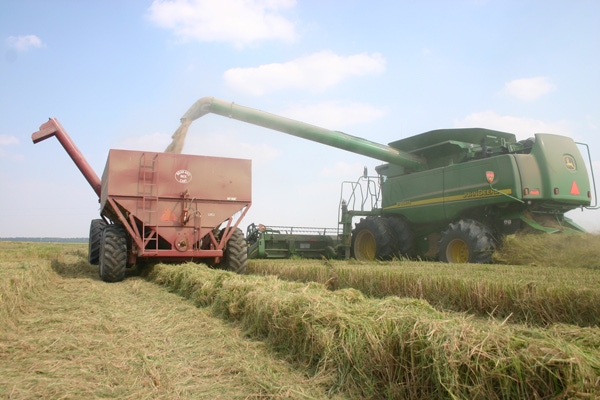
Business management and communications practices are changing at a rate that necessitates continuous education and fresh skills to become fully successful.Since 1989, the Rice Leadership Development Program has equipped more than 140 young men and women for rice industry leadership roles at the local, state and national level.John Deere Company, RiceTec, Inc., and American Commodity Company sponsor the program through a grant to the Rice Foundation, the research and education arm of the rice industry. The USA Rice Federation administers it.The program provides future leaders with an understanding of the rice industry, with an emphasis on personal development and communications skills.
February 28, 2011

Many of today’s farmers inherited agricultural production as a profession — becoming the second- or third-generation to pursue farming as career.
But even with the accumulated knowledge passed on to the new generation of farmers, modern business management and communications practices are changing at a rate that necessitates continuous education and fresh skills to become fully successful — and it’s important not just for producers, but for all segments working in agriculture.
Since 1989, the Rice Leadership Development Program has equipped more than 140 young men and women for rice industry leadership roles at the local, state and national level.
John Deere Company, RiceTec, Inc., and American Commodity Company sponsor the program through a grant to the Rice Foundation, the research and education arm of the rice industry. The USA Rice Federation administers it.
The program provides future leaders with a comprehensive understanding of the rice industry, with an emphasis on personal development and communications skills.
During a two-year period, seven class members — five producers and two industry-related professionals selected from rice-producing states — attend four one-week sessions designed to strengthen leadership through studies of all aspects of the rice industry.
The hands-on sessions take participants through instructional visits with producers, processors, millers, as well as legislative and regulatory representatives. In addition, class members visit water management specialists, wildlife conservation organizations, trade associations, and the Chicago Board of Trade, a key entity in the marketing of U.S.-grown rice. The group also tours the world headquarters of John Deere in Moline, Ill.
In addition to the guidance from industry segments, the group receives communication skills development preparation, including public speaking and media training. Many of the graduates of the leadership program are now serving on various committees and boards on a local, state and national level.
“The opportunity to meet people who work in the U.S. rice industry has meant so much to me,” said program alumna and Arkansas rice grower Jennifer James, chairman of the USA Rice Federation Communications Committee and Sustainability Task Force. “It has given me the opportunity to ask questions and continue to learn about the industry and gave me the confidence to serve in leadership capacities within the rice industry.”
“The program gives individuals the tools to hone their leadership skills so they can be strong, well-versed, knowledgeable representatives of the U.S. rice industry,” said Chuck Wilson, director of The Rice Foundation. “I have always said that an industry is only as strong as its leaders. The program helps build a base of strong, young leaders.”
Each year, a new leadership class is announced during the USA Rice Outlook Conference in December and the completion of their two-year training program is marked with a special graduation ceremony at the USA Rice Government Affairs Conference in February. This continuous effort to train and inspire participants increases the likelihood that the rice industry will have strong representation in the future.
“I am looking forward to sharing ideas and visions with other leaders in the rice industry and working together to make a difference,” said Brendan O’Donnell, sales manager at Bunge Milling and a member of the 2011 program class.
Going Overseas
A new element of the leadership program is an international session, added in 2009 after RiceTec, Inc., became a sponsor. The session enables participants to study a specific country’s rice market and observe its rice import and distribution systems as well as review industry marketing activities in the region.
Participants also meet with key U.S. agriculture and government officials responsible for importing food and providing food security. The international session is available to graduates of the program who have, since graduation, applied their leadership skills to industry service.
International session participants recently traveled to Istanbul, Turkey. During the weeklong visit, the group met with executives from Akel Company, a major U.S. rice importer and Turkey’s rice market leader, and Pakder, the Turkish Rice and Pulses Packers Association that has more than 70 members. Participants also met with executives of Tugider, the Turkish Food Foreign Trade Association, which works closely with USA Rice to ease import restrictions and address import bans; and Samet Serttas, a U.S. Department of Agriculture Foreign Agricultural Service representative.
Turkey was chosen as the destination for the session because of its growing importance to the U.S. rice industry. Turkey purchased $151.9 million (342,097 metric tons) in U.S.-grown rice from January through November 2010 and is the third-largest export market by volume for U.S. rice exports over the same time span.
The program’s success is based on the principle of giving back — from the corporate sponsors who make the program possible to the producer and industry members who give generously of their time and expertise to make each session productive and rewarding. It’s an opportunity for the industry to impart in-depth knowledge, training and experience that reaps rewards when class members use their leadership skills to benefit the U.S. rice industry.
“When there are issues in the industry, I try to think about how it affects all segments — producers, merchants, millers, and end users of rice,” James said. “The program showed me that each segment relies on the other and that we must work together to keep U.S. rice industry a thriving part of our economy.”
You May Also Like



